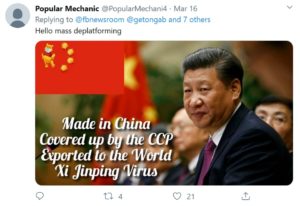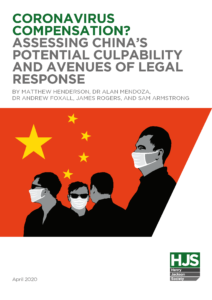 In the six days after top Chinese officials secretly determined they likely were facing a pandemic from a new coronavirus, the city of Wuhan at the epicenter of the disease hosted a mass banquet for tens of thousands of people; millions began traveling through for Lunar New Year celebrations, AP reports:
In the six days after top Chinese officials secretly determined they likely were facing a pandemic from a new coronavirus, the city of Wuhan at the epicenter of the disease hosted a mass banquet for tens of thousands of people; millions began traveling through for Lunar New Year celebrations, AP reports:
President Xi Jinping warned the public on the seventh day, Jan. 20. But by that time, more than 3,000 people had been infected during almost a week of public silence, according to internal documents obtained by The Associated Press and expert estimates based on retrospective infection data.
“Doctors in Wuhan were afraid,” said Dali Yang, a professor of Chinese politics at the University of Chicago. “It was truly intimidation of an entire profession.”
If China’s leadership cannot reignite elevated growth to fulfil the aspirations of the middle class, if unemployment becomes a persistent problem and if property prices finally fall, then the regime will be in hazardous territory, argues George Magnus, the author of Red Flags: Why Xi’s China is in Jeopardy, and research associate at Oxford University’s China Centre and at SOAS.
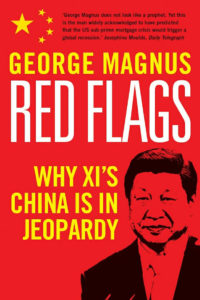 For now, however, Xi looks reasonably secure. Yet he has enemies, he writes for the New Statesman:
For now, however, Xi looks reasonably secure. Yet he has enemies, he writes for the New Statesman:
- More than one million party members have been incarcerated or punished by Xi’s extra-judicial anti-corruption campaign. They have families. Private sector firms, the core of the economy, employment and innovation, are being sidelined or discriminated against for political reasons. Top party officials always play cards close to their chests, but it is thought not all are happy with Xi’s approach to the US and much else.
- Domestic opposition to Xi might crystallise more if only there were a united and orchestrated Western counter to China’s bid to shape global institutions and nations according to its own standards and values. At present, amid the coronavirus crisis, that looks like a distant prospect. We must hope for better as we heal, and with time.
The official urban unemployment rate of 6.2 per cent in February understates the true level of joblessness and doesn’t include China’s 280m migrant worker population, many of whom haven’t returned to work yet, Magnus writes for the FT:
Close to 500,000 small and medium-sized businesses, the heart of the economy, which were sidelined politically before the crisis, are reported to have failed in the first quarter alone. The hope that exports might come to the rescue now seems forlorn. The pandemic has sunk demand into a crater around the world, with no early or significant economic recovery in sight.
As China in March became the first major country to recover from the coronavirus outbreak that spread from central city of Wuhan, its officials kicked off another ‘sharp power’ campaign: to heal its tattered international image, the Washington Post reports (HT: FDD).
The Chinese Communist Party’s predilection for disinformation campaigns and coercive tactics as part of its diplomatic tool kit have produced a self-induced diplomatic debacle, adds CFR analyst Elizabeth Economy.
The coronavirus (COVID-19) epidemic has revealed the corruption of Chinese authoritarianism under Xi Jinping. In an unsparing critique, Tsinghua University professor Xu Zhangrun argues in the latest issue of the NED’s Journal of Democracy that Chinese governance and political culture under the Chinese Communist Party have become morally bankrupt.
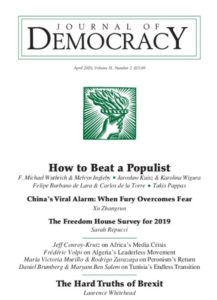 The Party deceived the Chinese people as the viral outbreak in Wuhan spread across China before developing into a global pandemic. Chinese officials were more concerned with censoring the internet and news of the disease to preserve Xi’s one-man rule than with protecting the people from a public-health disaster. Xu calls on his fellow citizens to reject the strongman politics of the People’s Republic in favor of greater reform and the creation of a constitutional democracy:
The Party deceived the Chinese people as the viral outbreak in Wuhan spread across China before developing into a global pandemic. Chinese officials were more concerned with censoring the internet and news of the disease to preserve Xi’s one-man rule than with protecting the people from a public-health disaster. Xu calls on his fellow citizens to reject the strongman politics of the People’s Republic in favor of greater reform and the creation of a constitutional democracy:
- Politics in a New Era of Moral Depletion
First and foremost, I would posit that the political life of the nation is in a state of collapse and that the ethical core of the system has been rendered hollow. The ultimate concern of China’s polity today and that of its highest leader is to preserve at all costs the privileged position of the Communist Party and to maintain ruthlessly its hold on power….
They now pursue their rule over the people via what I would call “big-data totalitarianism” and “WeChat terror.” Although the Communist Party has reformulated its ideology in various guises over the decades, it has not fundamentally changed…..RTWT
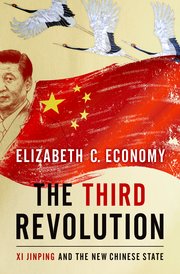 China’s Communist Party is like the mythological hydra of ancient Greece—a multi-headed serpentine beast that can approach its prey from multiple directions, feinting and distracting before eventually attacking. Cut off only one of its nine heads, and two will grow in its stead, adds CFR’s Economy, author of The Third Revolution: Xi Jinping and the New Chinese State:
China’s Communist Party is like the mythological hydra of ancient Greece—a multi-headed serpentine beast that can approach its prey from multiple directions, feinting and distracting before eventually attacking. Cut off only one of its nine heads, and two will grow in its stead, adds CFR’s Economy, author of The Third Revolution: Xi Jinping and the New Chinese State:
Other nations have exemplified the type of leadership needed in the face of such a crisis—in particular, Taiwan, South Korea, and Japan. Unfortunately, none of these has the political, economic, and military wherewithal to lead globally over the long term. The only question that remains now is whether China or the United States will rise to the occasion in the aftermath of the crisis to demonstrate another quality of great leadership: an ability to learn, adapt, and do better.

